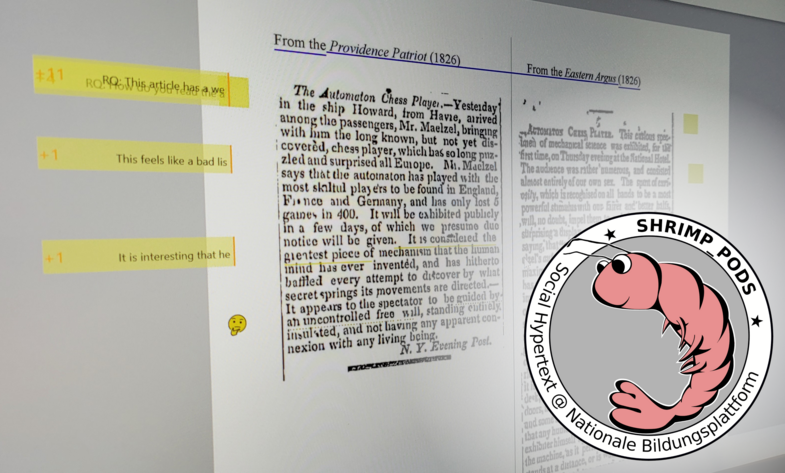SHRIMP_PODS, a novel elearning platform under development at Leipzig University, transfers central skills and methods of academic reading—annotating, commenting, linking, discussing—into the digital realm. This allows a collaborative and social learning experience, especially in the text-based humanities. SHRIMP_PODS is part of the project “Social Hypertext Reader & Interactive Mapping Platform” (SHRIMP) at the Institute for American Studies. It is also part of a BMBF project for the development of a national metaplatform “Nationale Bildungsplattform.”
Workshops for SHRIMP_PODS
In order to get to know the platform and explore its didactic possibilities we offer a ninety-minute workshop. You can choose from the following dates:
- In-person workshop on January 30 (Monday),
5:15 – 6:45 p.m., Hörsaalgebäude (Lehrpool H -02): -
Online Workshop on February 21 (Tuesday),
1:15 – 2:45 p.m., online (Zoom):
Register for workshop
If you are generally interested in using SHRIMP_PODS for teaching, but cannot attend any of these workshops, feel free to register via the form for future workshops. Participation in the workshop is not mandatory for using SHRIMP_PODS, but it enables you to understand and use the platform faster and to get back to us with your questions immediately. Seats are limited. If you are interested, be sure to register right away.
Functions and Uses of SHRIMP_PODS
On SHRIMP_PODS, instructors can build individual learning resources, called “Pods,” which are composed of PDF files. SHRIMP_PODS augments these regular PDFs by adding an interactive layer. This layer allows teachers to add reading questions and to link additional information in order to guide students though the reading. Learners can explore texts individually and add private annotations, but they can also discuss texts collaboratively, add comments, questions, tags, links, or emoticon reactions.

